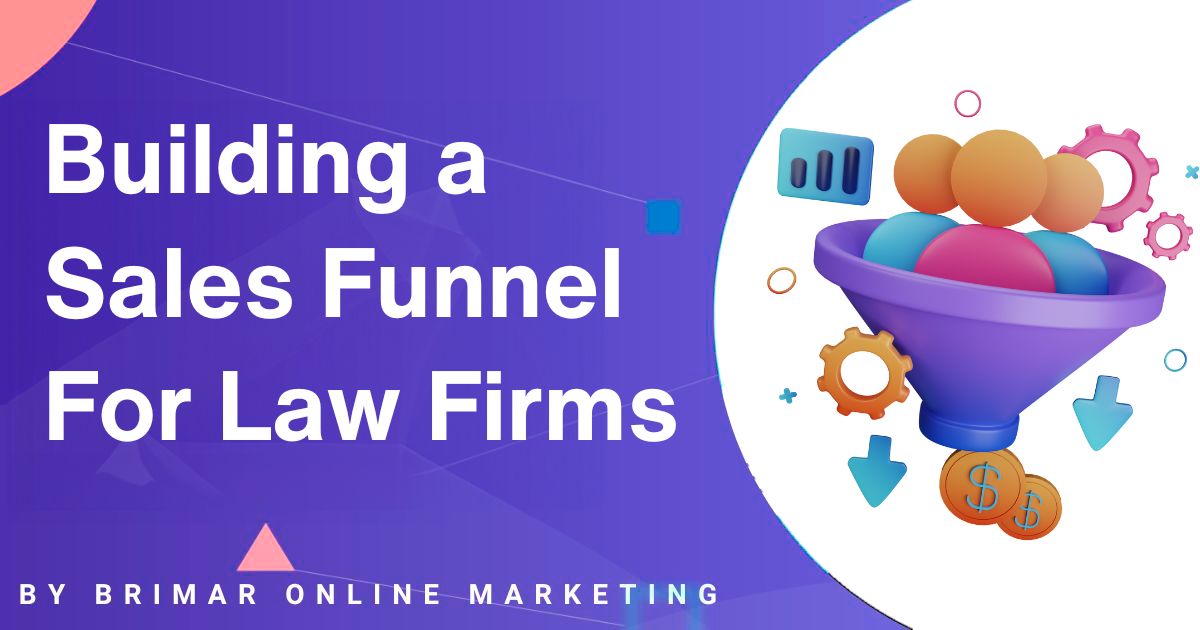
Why Law Firms Need a Sales Funnel
Building a sales funnel is one of the most innovative ways law firms can consistently attract and convert clients.
Rather than waiting for potential clients to find you and hoping they’ll reach out, a sales funnel guides them through a straightforward journey, from their first interaction with your brand to that all-important first consultation.
This approach doesn’t just bring in any leads; it attracts qualified leads, the people who are most likely to need your specific legal services and are ready to become paying clients.
In the competitive legal industry, standing out requires more than expertise.
Law firms are constantly competing for attention, so a well-structured sales funnel is essential for reaching a wider audience and capturing genuine interest.
A strong funnel doesn’t only drive brand awareness; it systematically nurtures and engages your audience, gradually converting them into loyal clients.
A well-thought-out sales funnel is a must-have strategy for any law firm aiming to build a reliable client base and stay ahead of the competition.
Understanding the Sales Funnel for Law Firms
A law firm’s sales funnel is broken down into three main stages: Top of the funnel, Middle of the funnel, and Bottom of the funnel.
Each stage serves a unique purpose, addressing the specific needs of prospective clients at different points in their journey toward hiring legal help.
- Top of the Funnel: Awareness
This is the first interaction potential clients have with your firm. At this stage, they may not be actively looking for legal representation; they’re simply gathering information and exploring options.
Content that builds brand awareness, like blog posts addressing common legal questions, informative social media posts, and helpful videos, is vital here.
By providing valuable content that answers questions and educates, you establish yourself as a trusted source for legal knowledge and set the foundation for future engagement. - Middle of the Funnel: Consideration and Engagement
Now that potential clients know about your firm, the goal is to deepen their interest. This stage focuses on showing prospective clients how you can specifically address their needs.
Content like case studies, client testimonials, and more detailed blog posts about specific legal issues can be powerful tools to build trust.
Effective lead-nurturing strategies include email marketing and downloadable resources that speak directly to common legal problems your ideal clients face.
In the middle of the funnel, you position yourself as the logical choice to meet their legal needs. - Bottom of the Funnel: Conversion
This is the point where potential clients make their final decision. At the bottom of the funnel, they’re ready to take the next step, often prompted by a call to action like scheduling a free consultation or filling out a contact form.
Your goal is to make this decision easy by providing a seamless experience, whether it’s through a well-designed landing page, easy-to-navigate contact information, or a compelling offer that fits their needs.
In this final stage, they transition from being prospective clients to committed, paying clients; your ultimate goal for every lead that enters your funnel.
Need a Sales Funnel that Converts?
Struggling to turn clicks into customers?
A high-converting sales funnel could be the missing link. We’ll help you build a simple, straightforward, and effective funnel that guides your visitors step-by-step, so they take action, not just browse.
Top of the Funnel: Building Awareness and Initial Interest

Building brand awareness and making a memorable first impression are key to getting your law firm in front of potential clients.
You cast the widest net at the top of the funnel to attract as many eyes as possible.
The goal is to help people recognize your firm as a trusted resource for their legal questions and needs, especially when determining what type of legal help they might require.
Content marketing is one of the most effective ways to reach new visitors.
Consider blog posts that answer common legal questions or provide insights into typical legal situations.
For example, you could publish articles that explain the basics of personal injury law, outline the steps in a divorce, or explain what to expect in a first consultation.
These types of posts help establish credibility and start conversations with potential clients who are seeking information.
Adding video content, such as short clips that answer frequently asked questions or share brief “how-to” legal tips, can also be powerful.
Videos perform well on social media and are a great way to engage users who prefer watching over reading.
Lead magnets are another intelligent approach.
These are valuable, downloadable resources that website visitors can access by providing their email addresses.
A lead magnet could be something like a legal FAQ guide, an infographic explaining the steps in a personal injury claim, or a checklist for consultation preparation.
These types of resources give people helpful information right away while allowing you to gather contact details for future follow-up.
Finally, investing in best SEO practices is essential.
Optimizing them for search engines ensures that your blog posts, videos, and lead magnets reach the right audience.
This means using relevant keywords related to your practice areas, crafting meta descriptions that encourage clicks, and building internal links to other content on your site.
Good SEO helps your content rank well on Google and other search engines, boosting your chances of being found by potential clients when they’re looking for legal advice.
Middle of the Funnel: Educating and Engaging Potential Clients

Once people know your law firm and show initial interest, it’s time to start nurturing these leads with more in-depth, valuable content.
This middle stage of the funnel is all about building trust and showcasing your expertise.
It helps prospective clients understand why your firm is the right choice for their specific legal needs.
One way to do this is by offering detailed content demonstrating your knowledge in various practice areas.
Webinars, for example, provide an opportunity to present complex legal topics in a way that’s accessible and informative.
You might host a webinar on “What to Expect During a Divorce Process” or “How to Handle a Personal Injury Case,” giving attendees insights that build their confidence in your firm’s capabilities.
Case studies are also impactful; they highlight real-life examples of cases you’ve handled, showcasing the results you’ve achieved and the type of care you put into each case.
Additionally, client testimonials are incredibly persuasive, offering firsthand accounts of past clients’ positive experiences with your firm.
At this stage, email marketing and social media marketing are key to keeping prospective clients engaged and interested.
Consider sending out a series of informative emails that provide more in-depth content, perhaps touching on specific legal topics or answering questions people might have at this point in their journey.
Social media is also useful for staying top-of-mind and showing a human side to your firm; sharing helpful legal tips, client success stories, and updates can go a long way in building a connection with your audience.
Don’t forget the practical aspects of lead nurturing.
Use contact forms on your website to encourage people to contact you or request a consultation.
Also, build your email list so you can consistently follow up.
By nurturing these leads with valuable information and making it easy for them to contact you, you’ll build a solid foundation of trust and ensure that your firm is ready to help with their specific legal needs.
Bottom of the Funnel: Converting Leads into Clients

When you’re at the bottom of the funnel, your goal is clear: turn those leads into clients.
Here’s where you want to make the decision easy, inviting, and seamless.
Start by offering something they can’t refuse, like a free consultation.
A personalized approach, showing that you understand their unique legal concerns, can make a huge difference in winning over potential clients.
On your landing page, every detail counts.
Make it easy for visitors to take action, whether filling out a contact form, scheduling a call, or even clicking through for more information about your legal services.
A straightforward call to action at every turn makes it easy for visitors to reach out, which is precisely what you want.
Include multiple ways for them to connect, from phone numbers to quick links for setting up a consultation.
Trust is everything when choosing legal representation.
Adding client testimonials, positive reviews, and even specific case examples (where possible) can reassure visitors that they’re making the right choice.
When people see proof that others have had a great experience with you, they’re more likely to feel comfortable reaching out themselves.
Finally, consider using PPC ads and Google Ads to capture those high-intent leads who are actively searching for legal help.
These ads can place you right in front of people ready to decide, bringing in a steady stream of highly interested prospects.
With this combination of techniques, you can turn visitors into paying clients.
Retaining and Growing Your Client Base Post-Conversion
Once you’ve converted a lead into a client, your work doesn’t stop.
Keeping that client engaged and happy can open doors to referrals and even future work.
One of the most effective ways to stay connected is through follow-up emails.
These can be as simple as checking in to see how they’re doing or offering valuable legal updates relevant to their case or needs.
Social media is another great way to maintain client relationships.
Stay active on social media platforms to keep past clients informed and engaged, sharing updates or tips that can be useful to them.
Hosting or participating in community events can also allow you to connect with clients outside the office, adding a personal touch to your relationship.
Email marketing is invaluable for staying in touch.
Regular newsletters or updates remind clients of your services and can educate them on important legal topics they might need in the future.
Sharing valuable information in these emails, whether it’s recent legal news or tips on everyday issues, makes you a resource they’re more likely to return to.
As you stay in touch, you’re building loyalty, so if they or someone they know ever needs legal help again, they’re more likely to remember you.
Keeping that connection strong over time can transform new clients into loyal clients who see you as their go-to for any future legal needs.
Best Practices for a Successful Law Firm Marketing Funnel
Creating a successful sales funnel for a law firm takes a blend of strategy, persistence, and an understanding of what potential clients genuinely seek.
Unlike other industries, law firms face specific marketing challenges, so aligning your approach with these unique needs can make all the difference.
Let’s dive into some effective marketing strategies and practical steps to ensure your funnel captures attention and builds trust.
Start with a strong mix of digital marketing methods to reach potential clients at every stage.
Use online advertising, like Google Ads and social media platforms, to increase visibility and attract initial interest.
While online ads can be powerful for reaching a broad audience, traditional tactics like business cards or sponsoring local events can also significantly impact you, especially if you’re a smaller firm looking to build community connections.
To ensure your messaging hits home, pay close attention to your keywords.
In the legal industry, terms like “legal matter,” “legal representation,” “legal needs,” and “specific practice areas” resonate deeply because they align with clients’ search criteria.
Keywords aren’t just for your website; they should also inform content across all channels, from blog posts and videos to social media updates.
Clients who see messaging that speaks directly to their needs are more likely to move from initial interest to engagement.
Now, let’s talk about the journey itself.
A strong funnel should guide potential clients smoothly from the first touchpoint to the final decision to hire you.
Each step should feel purposeful and intentional.
Your website should make it easy to request a free consultation, with visible calls to action on every page.
Emails should offer valuable insights, answer common legal questions, or showcase your expertise through case studies.
Think of each interaction as a way to address a client’s concerns and build trust.
Keeping your sales funnel efficient and clear is essential for lead conversion.
From the initial click to that final consultation, aim to simplify each step, reducing friction points that could lead to drop-offs.
The more straightforward the process, the higher your chances of converting leads into clients.
Taking the Next Steps with Your Law Firm’s Sales Funnel
Building an effective sales funnel for your law firm means focusing on the client journey at every stage, from the top of the funnel to the final decision to hire you.
It’s all about understanding your clients’ needs, guiding them toward the solutions they’re seeking, and providing them with the correct information at the right time.
Starting with the initial steps of funnel-building can be a powerful way to gain insights into your ideal client.
By identifying their concerns, you’ll be better positioned to tailor your approach, build your client base, and grow your reputation.
Remember, a well-designed funnel attracts leads and establishes a solid foundation for long-term client relationships.
For best results, regularly track and optimize each part of your funnel.
Pay attention to conversion rates and identify areas where clients might drop off.
Adjust your strategy as you go, ensuring that you’re meeting the evolving needs of potential clients and making it easy for them to choose you for their legal needs.
Ready to take your law firm’s marketing funnel to the next level?
Brimar Online Marketing specializes in creating customized sales funnels that capture leads, engage potential clients, and drive conversions.
Let’s work together to build a funnel that meets your firm’s goals and supports your growth.
Reach out to us today, and let’s start designing a funnel that works for you!
Our Digital Marketing Services Have Helped Our Clients Increase Their Revenue!
“I highly recommend Brimar if your looking to grow your online business. You will be satisfied with the high level of expertise and high quality of services. It has helped my business grow by leaps and bounds.”
CEO
